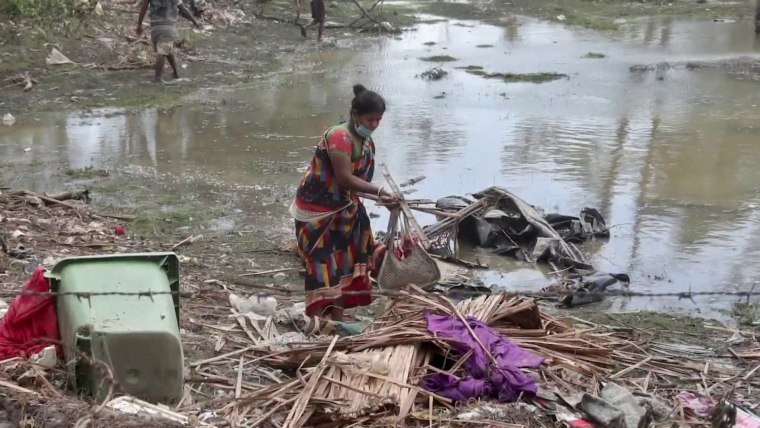Rain fell for several hours at the highest point on the Greenland ice sheet last week — the first rainfall event in recorded history at a location that rarely creeps above freezing temperatures.
Scientists confirmed Wednesday that rain was observed Saturday at Summit Station, a research facility that sits atop the Greenland ice sheet and is operated year-round by the National Science Foundation. It was the first report of rain at the normally frigid summit, and it marks only the third time in less than a decade that above-freezing temperatures were recorded at the Arctic research station, according to the National Snow and Ice Data Center.
The rare rainfall caused significant melting at the summit and along the ice sheet's southeastern coast over the weekend and occurred just weeks after the region experienced a separate extensive melting event in late July. The recent warm spell adds to concerns that climate change is rapidly melting ice in the Arctic, which accelerates sea-level rise around the world.
Above-freezing temperatures were recorded at Summit Station, which sits at an elevation of 10,551 feet above sea level, beginning Saturday at 5 a.m. local time. The National Snow and Ice Data Center estimated that over the course of three days 7 billion tons of rain fell over the ice sheet.
"Warm conditions and the late-season timing of the three-day melt event coupled with the rainfall led to both high melting and high runoff volumes to the ocean," National Snow and Ice Data Center researchers said in a statement.
The rain and warmer-than-usual temperatures were caused by a region of low air pressure that settled over Baffin Island and a ridge of high pressure over southeast Greenland that pushed warm air and moisture up from the south.
The melting peaked Saturday, affecting 337,000 square miles of ice, according to the National Snow and Ice Data Center. By Monday, the area of melted ice had returned to "moderate levels," the researchers said.
Greenland's sprawling 656,000-square-mile ice sheet expands and contracts as part of natural yearly variations, but global warming is causing glacial ice to melt at a rapid pace. Some climate models suggest that without aggressive climate interventions, the Arctic Ocean could be ice-free in the summers by 2050.
The consequences of that would be catastrophic. If Greenland's ice sheet were to completely melt, scientists have said global sea levels could rise more than 20 feet, affecting coastal communities around the world and submerging low-lying cities such as Shanghai, Amsterdam and New York.
Last week, the United Nations Intergovernmental Panel on Climate Change released a blistering report on the state of climate change, saying climate change is intensifying, occurring at an accelerated pace and is already affecting every region of the planet. The assessment also found that some changes that are already playing out, such as warming oceans and rising sea levels, are “irreversible for centuries to millennia.”
"time" - Google News
August 20, 2021 at 03:44AM
https://ift.tt/3syCFZd
It rained for the first time at the summit of Greenland's ice sheet - NBC News
"time" - Google News
https://ift.tt/3f5iuuC
Shoes Man Tutorial
Pos News Update
Meme Update
Korean Entertainment News
Japan News Update
Bagikan Berita Ini















0 Response to "It rained for the first time at the summit of Greenland's ice sheet - NBC News"
Post a Comment